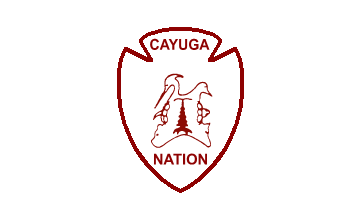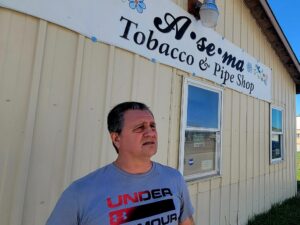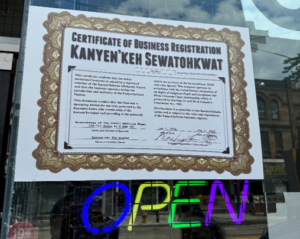From Finger Lake Times by David L Shaw October 11 2024
SENECA FALLS — For a second time, a State Supreme Court Judge has ruled that a cannabis sales shop on Lower Lake Road is operating illegally.
Judge Kevin Nasca has reaffirmed an earlier decision by Judge Daniel Doyle that Gramma Approved Sovereign Trades, operated out of a shed-type building by Cayuga Nation member Carlin Seneca-John is “unlawful as a matter of law” and those operating it are “engaged in continued unlawful activity in violation of town of Seneca Falls codes.”
The town of Seneca Falls also was named as a respondent to the petition filed by the Cayuga Nation and Seneca Falls residents Gordon and Joan Burgess.
Seneca-John is a member of a faction of the Cayuga Nation opposed to federally-recognized representative Clint Halftown and the Cayuga Nation Council he heads. Council officials operate Nation-sponsored cannabis shops in Seneca Falls and Union Springs and say Gramma Approved does not have Council approval.
In a statement issued Wednesday, Nation officials said from the day Gramma Approved Sovereign Trades opened three years ago, it has been operating in violation of both tribal law and Seneca Falls town codes, operating from a “toolshed” in a residential area.
“When the town refused to take any action to put a stop to it, the Nation commenced a lawsuit in Seneca County Supreme Court and ultimately obtained a judgment declaring what the town refused to acknowledge: that the business and those operating it engaged in illegal conduct,” the statement read.
Several years after the initial judgment was issued, Seneca-John asked the court to vacate the judgment and rescinded its declaration of illegality.
The Nation and the Burgesses sought a declaratory judgment and an order directing the town to enforce its zoning code and declare the Lower Lake Road property cannot be used as a commercial enterprise in an R-1 zone, even with a special use permit.
The town moved to dismiss the application and Judge Doyle agreed. Doyle also further dismissed the application based on the petitioners’ failure to establish that they have standing to seek declaratory relief. His rulings were appealed to the Fourth Department Appellate Division Court in Rochester.
That five-judge panel found that Doyle erred on the issue of standing and reinstated the second cause of action that sought a declaratory judgment. The town and Seneca-John did not respond, and Doyle granted the petitioners’ motion for a default judgment, which was unopposed. Seneca-John then filed to vacate the default judgment and dismiss the lawsuit, claiming the Nation engaged in misconduct.
In his Oct. 4 ruling, Nasca denied that and all other arguments raised by Seneca-John.
“The town must act to enforce its laws and the Nation will continue to pursue its effort to protect the safety and well-being of it citizens and root out those who would do the community harm,” the statement concluded.


















Comments are closed.